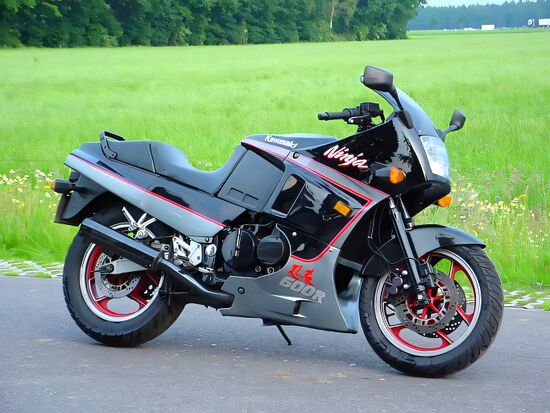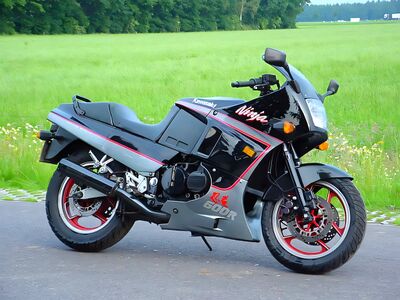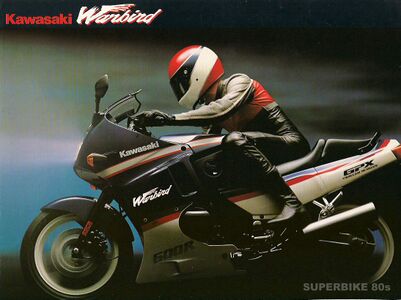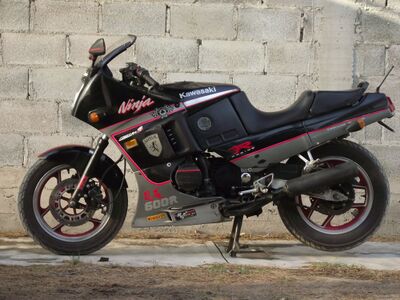Difference between revisions of "Kawasaki GPX600"
m |
m |
||
| (4 intermediate revisions by the same user not shown) | |||
| Line 1: | Line 1: | ||
| − | {{DISPLAYTITLE:Kawasaki GPX 600 (GPX600R, ZX600C)}} | + | {{DISPLAYTITLE: Kawasaki GPX 600 (GPX600R, ZX600C)}} |
| − | |||
{{#seo: | {{#seo: | ||
| − | |keywords= | + | |keywords={{PAGENAME}}, review, specs, owners manual, service manual, guide |
| + | |og:image=https://en.enduro.team/images/4/4e/Gpx_1.jpg | ||
}} | }} | ||
__notoc__ | __notoc__ | ||
| − | + | [[Image: Gpx_1.jpg | 550px | center | Kawasaki GPX 600R]] | |
| − | + | The '''Kawasaki GPX600R''' sports bike model entered the market in 1988 as a successor to the [[Kawasaki_GPZ600 | Kawasaki GPZ600R]]. In the North American market, both models were sold under the name Kawasaki Ninja 600R and had no division into GPZ and GPX. | |
| − | |||
| − | |||
| − | |||
| − | |||
{{Ads_top}} | {{Ads_top}} | ||
| − | |||
| − | + | ''' Main competitors: ''' | |
| − | * | + | * [[Honda_CBR600F | Honda CBR600F (1987-1990)]] |
| − | + | * [[Yamaha_FZR600 | Yamaha FZR 600]] | |
| − | |||
| − | |||
| − | * | ||
| − | + | Compared to the [[Kawasaki_GPZ600 | Kawasaki GPZ600R]], the new version of the Kawasaki GPX600R gets a number of technical differences: | |
| − | + | * '''Engine'''. I got lightweight connecting rods and pistons, increased the diameter of the intake ports, and increased the compression ratio from 11.0 to 11.7. Maximum power increased to 84 hp. | |
| + | * '''Ignition'''. The model receives a more advanced digital ignition. | ||
| + | * '''Exhaust'''. The model gets a new 4-in-2 exhaust system. | ||
| + | * '''Brakes'''. The 1-piston front and rear brakes are replaced with more efficient 2-piston brakes. | ||
| + | * '''Wheels'''. The front wheel comes with a slightly reduced profile (80 mm instead of 90 mm). | ||
| + | * '''Pendants'''. The model gets a thicker fork (38 mm instead of 37 mm) and an electric anti-bite system ESCS instead of mechanical AVDS. | ||
| − | + | The Kawasaki GPX600R was an export model and was only sold in the European and North American markets. A 400 cc version [[Kawasaki_GPX400 | Kawasaki GPX400R]] was offered for the domestic Japanese market. It is worth noting that the domestic Japanese modifications of the GPZ were equipped with an aluminum frame from the very beginning (only the GPX received a steel frame), while the GPZ600 and GPX600 came with a steel frame (the only exception is the American version of the 1987 Ninja 600RX). | |
| − | |||
| − | |||
| − | + | The Kawasaki GPX 600 model existed on the market until 1997 inclusive, after which it finally left the assembly line, giving way to the [[Kawasaki_ZZR600 | Kawasaki ZZ-R600]] and [[Kawasaki_ZX-6R_ (636) | Kawasaki ZX-6R]] models. | |
| − | |||
| − | |||
| − | |||
| − | |||
| − | |||
| − | |||
| − | == == | + | == Photos == |
| + | <gallery mode="packed" heights=200px> | ||
| + | File:Gpx 1.jpg| | ||
| + | File:Kawasaki GPX 600R Ninja 89 1.jpg| | ||
| + | File:690273e9a99435f48c17aa53f27b6f88.jpg| | ||
| + | </gallery> | ||
| + | {{Ads_feed}} | ||
{{Ads_post}} | {{Ads_post}} | ||
| − | == | + | == Specifications == |
| − | + | Specifications Kawasaki GPX600R: | |
| − | {| class="wikitable" | + | {| class = "wikitable" |
| − | ! scope="row"| | + | ! scope = "row" | Model |
| − | |Kawasaki GPX600R (Ninja 600R) | + | | Kawasaki GPX600R (Ninja 600R) |
| − | |||
| − | |||
| − | |||
|- | |- | ||
| − | ! scope="row"| | + | ! scope = "row" | Motorcycle type |
| − | | | + | | sports |
|- | |- | ||
| − | ! scope="row"| | + | ! scope = "row" | Release year |
| − | | | + | | 1988-1997 |
|- | |- | ||
| − | ! scope="row"| | + | ! scope = "row" | Frame |
| − | | | + | | steel tubular |
|- | |- | ||
| − | ! scope="row"| | + | ! scope = "row" | Engine type |
| − | | | + | | 4-cylinder, 4-stroke, in-line |
|- | |- | ||
| − | ! scope="row"| | + | ! scope = "row" | Working volume |
| − | | | + | | 592 cm³ |
|- | |- | ||
| − | ! scope="row"| | + | ! scope = "row" | Bore / Stroke |
| − | | | + | | 60.0 x 52.5mm |
|- | |- | ||
| − | ! scope="row"| | + | ! scope = "row" | Compression ratio |
| − | | | + | | 11.7: 1 |
|- | |- | ||
| − | ! scope="row"| | + | ! scope = "row" | Cooling |
| − | | | + | | liquid |
|- | |- | ||
| − | ! scope="row"| | + | ! scope = "row" | Number of valves per cylinder |
| − | | | + | | DOHC, 4 valves per cylinder |
|- | |- | ||
| − | ! scope="row"| | + | ! scope = "row" | Fuel supply system |
| − | | | + | | Carburetor, 4x Keihin CVK32 |
|- | |- | ||
| − | ! scope="row"| | + | ! scope = "row" | Ignition type |
| − | | | + | | digital |
|- | |- | ||
| − | ! scope="row"| | + | ! scope = "row" | Maximum power |
| − | | | + | | 84.0 h.p. (62.0 kW) at 11000 rpm |
|- | |- | ||
| − | ! scope="row"| | + | ! scope = "row" | Maximum torque |
| − | | | + | | 57.0 Nm (5.8 kg * m) at 9000 rpm |
|- | |- | ||
| − | ! scope="row"| | + | ! scope = "row" | Gearbox |
| − | | | + | | 6-speed |
|- | |- | ||
| − | ! scope="row"| | + | ! scope = "row" | Drive type |
| − | | | + | | chain |
|- | |- | ||
| − | ! scope="row"| | + | ! scope = "row" | Front tire size |
| − | | | + | | 110 / 80-16 55H TL |
|- | |- | ||
| − | ! scope="row"| | + | ! scope = "row" | Rear tire size |
| − | | | + | | 130 / 90-16 67H TL |
|- | |- | ||
| − | ! scope="row"| | + | ! scope = "row" | Front brakes |
| − | | | + | | 2 discs, 270 mm, 2-piston calipers |
|- | |- | ||
| − | ! scope="row"| | + | ! scope = "row" | Rear brakes |
| − | | | + | | 1 disc, 250 mm, 2-piston caliper |
|- | |- | ||
| − | ! scope="row"| | + | ! scope = "row" | Front suspension |
| − | | | + | | 38mm Telescopic (Air) Fork with ESCS (Anti-Peak), 140mm Travel |
|- | |- | ||
| − | ! scope="row"| | + | ! scope = "row" | Rear suspension |
| − | | | + | | linkage with pneumatic monoshock (adjustable rebound and preload), stroke - 130 mm |
|- | |- | ||
| − | ! scope="row"| | + | ! scope = "row" | Motorcycle length |
| − | | | + | | 2095 mm |
|- | |- | ||
| − | ! scope="row"| | + | ! scope = "row" | Motorcycle width |
| − | | | + | | 690 mm |
|- | |- | ||
| − | ! scope="row"| | + | ! scope = "row" | Motorcycle height |
| − | | | + | | 1150 mm |
|- | |- | ||
| − | ! scope="row"| | + | ! scope = "row" | Wheelbase |
| − | | | + | | 1425 mm |
|- | |- | ||
| − | ! scope="row"| | + | ! scope = "row" | Saddle height |
| − | | | + | | 755 mm |
|- | |- | ||
| − | ! scope="row"| | + | ! scope = "row" | Minimum ground clearance |
| − | | | + | | 115 mm |
|- | |- | ||
| − | ! scope="row"| | + | ! scope = "row" | Acceleration to 100 km / h |
| − | | | + | | 3.7 sec |
|- | |- | ||
| − | ! scope="row"| | + | ! scope = "row" | Maximum speed |
| − | | | + | | 220 km / h |
|- | |- | ||
| − | ! scope="row"| | + | ! scope = "row" | Fuel tank capacity |
| − | | | + | | 18.0 l |
|- | |- | ||
| − | + | ! scope = "row" | Motorcycle weight (curb) | |
| − | + | | 208 kg | |
| − | |||
| − | |||
| − | |||
| − | |||
| − | |||
| − | | | ||
|- | |- | ||
|} | |} | ||
| − | == | + | == Documentation == |
| − | * [[Kawasaki_GPX600:_manuals|Kawasaki GPX600 | + | [[Category:Motorcycles]] |
| + | * [[Kawasaki_GPX600:_manuals|Kawasaki GPX600]] | ||
== == | == == | ||
{{Ads_recomended}} | {{Ads_recomended}} | ||
Latest revision as of 13:34, 28 June 2023
The Kawasaki GPX600R sports bike model entered the market in 1988 as a successor to the Kawasaki GPZ600R. In the North American market, both models were sold under the name Kawasaki Ninja 600R and had no division into GPZ and GPX.
Main competitors:
Compared to the Kawasaki GPZ600R, the new version of the Kawasaki GPX600R gets a number of technical differences:
- Engine. I got lightweight connecting rods and pistons, increased the diameter of the intake ports, and increased the compression ratio from 11.0 to 11.7. Maximum power increased to 84 hp.
- Ignition. The model receives a more advanced digital ignition.
- Exhaust. The model gets a new 4-in-2 exhaust system.
- Brakes. The 1-piston front and rear brakes are replaced with more efficient 2-piston brakes.
- Wheels. The front wheel comes with a slightly reduced profile (80 mm instead of 90 mm).
- Pendants. The model gets a thicker fork (38 mm instead of 37 mm) and an electric anti-bite system ESCS instead of mechanical AVDS.
The Kawasaki GPX600R was an export model and was only sold in the European and North American markets. A 400 cc version Kawasaki GPX400R was offered for the domestic Japanese market. It is worth noting that the domestic Japanese modifications of the GPZ were equipped with an aluminum frame from the very beginning (only the GPX received a steel frame), while the GPZ600 and GPX600 came with a steel frame (the only exception is the American version of the 1987 Ninja 600RX).
The Kawasaki GPX 600 model existed on the market until 1997 inclusive, after which it finally left the assembly line, giving way to the Kawasaki ZZ-R600 and Kawasaki ZX-6R models.
Photos
Specifications
Specifications Kawasaki GPX600R:
| Model | Kawasaki GPX600R (Ninja 600R) |
|---|---|
| Motorcycle type | sports |
| Release year | 1988-1997 |
| Frame | steel tubular |
| Engine type | 4-cylinder, 4-stroke, in-line |
| Working volume | 592 cm³ |
| Bore / Stroke | 60.0 x 52.5mm |
| Compression ratio | 11.7: 1 |
| Cooling | liquid |
| Number of valves per cylinder | DOHC, 4 valves per cylinder |
| Fuel supply system | Carburetor, 4x Keihin CVK32 |
| Ignition type | digital |
| Maximum power | 84.0 h.p. (62.0 kW) at 11000 rpm |
| Maximum torque | 57.0 Nm (5.8 kg * m) at 9000 rpm |
| Gearbox | 6-speed |
| Drive type | chain |
| Front tire size | 110 / 80-16 55H TL |
| Rear tire size | 130 / 90-16 67H TL |
| Front brakes | 2 discs, 270 mm, 2-piston calipers |
| Rear brakes | 1 disc, 250 mm, 2-piston caliper |
| Front suspension | 38mm Telescopic (Air) Fork with ESCS (Anti-Peak), 140mm Travel |
| Rear suspension | linkage with pneumatic monoshock (adjustable rebound and preload), stroke - 130 mm |
| Motorcycle length | 2095 mm |
| Motorcycle width | 690 mm |
| Motorcycle height | 1150 mm |
| Wheelbase | 1425 mm |
| Saddle height | 755 mm |
| Minimum ground clearance | 115 mm |
| Acceleration to 100 km / h | 3.7 sec |
| Maximum speed | 220 km / h |
| Fuel tank capacity | 18.0 l |
| Motorcycle weight (curb) | 208 kg |
Documentation



